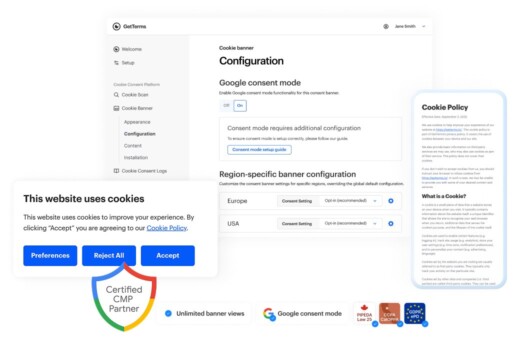
Cookie Consent Manager
GetTerms is a Google certified Consent Management Platform (CMP) that manages the entire user-consent process with a cookie banner, cookie policy, and unlimited user-consent logs.
Cookie Consent ManagerCompliance is hard.
We make it simple.
Consent management, cookie banner, privacy policy and more. Ready for your website in under 5 minutes.
Trusted by 500k customers. Compliant with global privacy laws, including the GDPR, CCPA, Law 25, CalOPPA & APP.

Create a comprehensive GDPR compliant privacy policy (privacy notice) that tells your website visitors how you process personal information.
Generate a clear Terms and Conditions agreement that sets out the ground rules between your business and your customers.
Manage cookie consent with a simple dashboard, unlimited storage for user cookie consent logs, & support for Google Consent Mode v2.
Add a GDPR & CCPA compliant customizable cookie banner that blocks scripts until consent is given, with no limits on page views or sessions.
Rated 5 stars
Great product. Super easy to use. Great support, fast and furious!

GetTerms is a Google certified Consent Management Platform (CMP) that manages the entire user-consent process with a cookie banner, cookie policy, and unlimited user-consent logs.
Cookie Consent Manager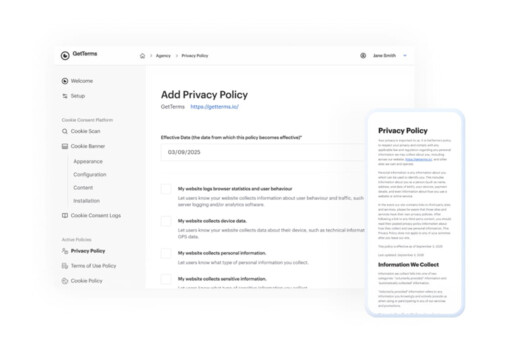
Quickly generate legal documents for your website or app. Written by lawyers in clear, human-friendly language your users can understand.
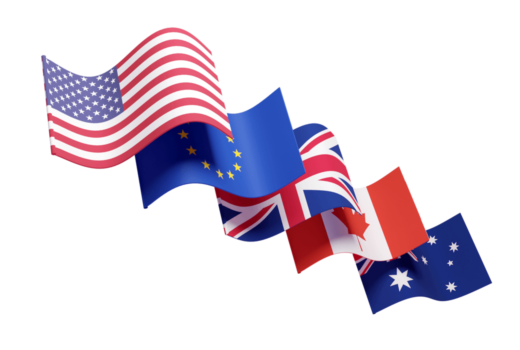
We automatically translate all of your policies and cookie banner into English (US and GB), Italian, French, Spanish, Hindi, and German.
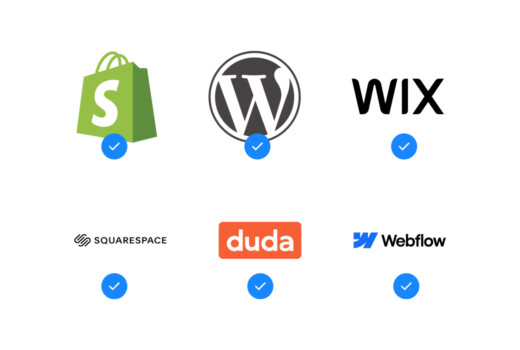
With GetTerms, it doesn't matter whether you're on WordPress, Shopify, Squarespace, Wix, Duda, or a completely custom CMS - it just works out of the box.

If you're using WordPress, you can download our plugin from the WordPress Plugin Directory to quickly install your cookie banner or embed your policies, without needing to access your theme code.

We keep you and our platform up to date with regulatory changes. Thanks to our live policy embed feature, your policies stay compliant, and you can quickly make any required changes directly from our dashboard.
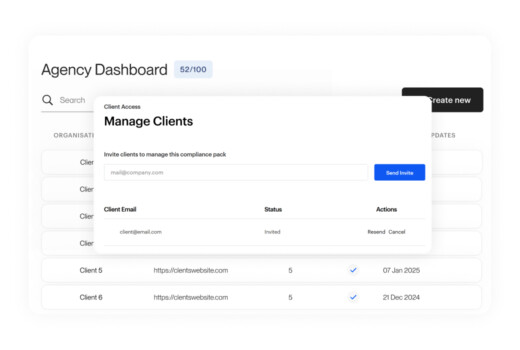
If you're not managing your clients' compliance, you could be. GetTerms makes it easy to support all your clients from one place. Set up and manage them yourself or invite them to manage their policies independently.
Agency programWhether you use WordPress, Wix, Squarespace, or any other CMS, choose GetTerms.
Developing a mobile app? Leave the legal mumbo jumbo to us & get back to it.
Running an online store? We'll make sure your customers are shopping with confidence.
Keep changing the world one product at a time, we'll handle the paperwork.
Rated 4.8
Rated 5 stars
Easy Compliance! Lots of changes always happing in the world of websites and I would rather be ahead of the curve than behind it. Fill out some basic information, install the plugin if you don't want to add code for WordPress sites, add to your page and done!
Rated 5 stars
The best GDPR tool! Honestly, of all the ones I've tried, this is the best. Intuitive and fast, with perfect results. Thank you, thank you, thank you!
Rated 5 stars
A No-Brainer! I've had the pleasure of using GetTerms on sites for over a year, and I have been nothing short of impressed. And with all the recent improvements and support, I'm happier than ever with the experience!
Rated 5 stars
Great product. Super easy to use. Great support, fast and furious!
Rated 5 stars
All the website policies you need! I was in need of exactly this + customer support is fantastic! Thank you Alistair for taking care of me! This is an absolute must-have! Highly recommend!
Rated 5 stars
Great service and extremely easy to use. Saves you from stressful thinking and saves lots of time.
Rated 5 stars
Thank you guys for making this so easy for my new website. I really appreciate you♥
Rated 5 stars
So easy to use. I plan on recommending it to all of my clients.
Studio K Ford
Rated 5 stars
Thank you Getterms! So easy to use and super handy for beginners :)
Rated 5 stars
So quick and easy. Saved me tons of time, when I have lots of projects going on. One less headache.
Rated 5 stars
Very easy to use. Much better experience than other online services with hidden fees
Rated 5 stars
A fantastic service I've used a few times now for various websites. I keep coming back because it is easy, comprehensive, and reasonably priced.
Rated 5 stars
Super fast and efficient. Thanks for saving me a headache
Rated 5 stars
Easy Compliance! Lots of changes always happing in the world of websites and I would rather be ahead of the curve than behind it. Fill out some basic information, install the plugin if you don't want to add code for WordPress sites, add to your page and done!
Rated 5 stars
The best GDPR tool! Honestly, of all the ones I've tried, this is the best. Intuitive and fast, with perfect results. Thank you, thank you, thank you!
Rated 5 stars
A No-Brainer! I've had the pleasure of using GetTerms on sites for over a year, and I have been nothing short of impressed. And with all the recent improvements and support, I'm happier than ever with the experience!
Rated 5 stars
Great product. Super easy to use. Great support, fast and furious!
Rated 5 stars
All the website policies you need! I was in need of exactly this + customer support is fantastic! Thank you Alistair for taking care of me! This is an absolute must-have! Highly recommend!
Rated 5 stars
Great service and extremely easy to use. Saves you from stressful thinking and saves lots of time.
Rated 5 stars
Thank you guys for making this so easy for my new website. I really appreciate you♥
Rated 5 stars
So easy to use. I plan on recommending it to all of my clients.
Studio K Ford
Rated 5 stars
Thank you Getterms! So easy to use and super handy for beginners :)
Rated 5 stars
So quick and easy. Saved me tons of time, when I have lots of projects going on. One less headache.
Rated 5 stars
Very easy to use. Much better experience than other online services with hidden fees
Rated 5 stars
A fantastic service I've used a few times now for various websites. I keep coming back because it is easy, comprehensive, and reasonably priced.
Rated 5 stars
Super fast and efficient. Thanks for saving me a headache
Rated 5 stars
I've lots of websites, I needed something to help me quickly add policies and cookie banners and GetTerms does the job... once done, it's set and forget.
Rated 5 stars
Great Deal for a Steal of a Price! GetTerms is a simple to use tool to help generate all the privacy policies, terms of service, cookie banners etc that's required by law on websites these days. Already added this to many client websites!
Rated 5 stars
I am delighted with GetTerms! Setting it up is really easy and embedding it via the code snippet or the WordPress plugin is also child's play. The menu navigation is very clear and intuitive, which makes the platform very pleasant to use.
Rated 5 stars
Absolutely easy to use. Loved everything about this service!
Rated 5 stars
Absolutely outstanding. quick and painless experience. Lovely to have something so worthwhile given to you free of charge and no strings attached. Thank you so much!
Rated 5 stars
I'm incredibly impressed in both the value and quality of service this policy generating service provides! This saved me SO much time and money!
Rated 5 stars
This was so easy to use. Absolutely Great Thanks, saved me quite a lot of time and effort in having to try and come up with my own words on a subject I knew very little about :)
Rated 5 stars
Brilliant! I keep returning to generate new policies with my clients. A comprehensive and excellently presented service.
Peak n Pedal Sports
Rated 5 stars
Quick, painless and economical way for our little enterprise to be compliant!
Rated 5 stars
Perfect. Easy. Acceptable price. Well written. Fast.
Rated 5 stars
Saves me $1000 of dollars in Law fees. And helps me understand polices in an easy to digest way
Rated 5 stars
I've lots of websites, I needed something to help me quickly add policies and cookie banners and GetTerms does the job... once done, it's set and forget.
Rated 5 stars
Great Deal for a Steal of a Price! GetTerms is a simple to use tool to help generate all the privacy policies, terms of service, cookie banners etc that's required by law on websites these days. Already added this to many client websites!
Rated 5 stars
I am delighted with GetTerms! Setting it up is really easy and embedding it via the code snippet or the WordPress plugin is also child's play. The menu navigation is very clear and intuitive, which makes the platform very pleasant to use.
Rated 5 stars
Absolutely easy to use. Loved everything about this service!
Rated 5 stars
Absolutely outstanding. quick and painless experience. Lovely to have something so worthwhile given to you free of charge and no strings attached. Thank you so much!
Rated 5 stars
I'm incredibly impressed in both the value and quality of service this policy generating service provides! This saved me SO much time and money!
Rated 5 stars
This was so easy to use. Absolutely Great Thanks, saved me quite a lot of time and effort in having to try and come up with my own words on a subject I knew very little about :)
Rated 5 stars
Brilliant! I keep returning to generate new policies with my clients. A comprehensive and excellently presented service.
Peak n Pedal Sports
Rated 5 stars
Quick, painless and economical way for our little enterprise to be compliant!
Rated 5 stars
Perfect. Easy. Acceptable price. Well written. Fast.
Rated 5 stars
Saves me $1000 of dollars in Law fees. And helps me understand polices in an easy to digest way
A To Go Life
Rated 5 stars
This was so easy. And for that I'm grateful. This is my first website and OMG the learning curve!!! This was exactly what we need to get started. I will be back for more!
Rated 5 stars
I was looking for a quick and easy policy creator and this is it. You input your information and they simply apply it to the policy.
Rated 5 stars
Are you kidding me?!?! This service is great! I'm a first time app builder and no one tells you about all the small stuff that you need. GetTerms had just what I needed to publish a solid privacy and terms of service statement.
Rated 5 stars
What a time saver! This service took the hassle out of drafting Policy as well as Terms and Conditions out for myself. Thank you.
Rated 5 stars
Wow - too easy - you need to pay your handsome squirrels a bonus - they're working overtime!
Hammer Lane Industries
Rated 5 stars
Super easy and simple to complete! Finally a policy generator that makes sense, is easy to use and friendly!
Rated 5 stars
Quick & Easy for my simple needs. And, completely free. No catches like other terms generators.
Rated 5 stars
This was an amazing experience and they have great support!
A To Go Life
Rated 5 stars
This was so easy. And for that I'm grateful. This is my first website and OMG the learning curve!!! This was exactly what we need to get started. I will be back for more!
Rated 5 stars
I was looking for a quick and easy policy creator and this is it. You input your information and they simply apply it to the policy.
Rated 5 stars
Are you kidding me?!?! This service is great! I'm a first time app builder and no one tells you about all the small stuff that you need. GetTerms had just what I needed to publish a solid privacy and terms of service statement.
Rated 5 stars
What a time saver! This service took the hassle out of drafting Policy as well as Terms and Conditions out for myself. Thank you.
Rated 5 stars
Wow - too easy - you need to pay your handsome squirrels a bonus - they're working overtime!
Hammer Lane Industries
Rated 5 stars
Super easy and simple to complete! Finally a policy generator that makes sense, is easy to use and friendly!
Rated 5 stars
Quick & Easy for my simple needs. And, completely free. No catches like other terms generators.
Rated 5 stars
This was an amazing experience and they have great support!
Key considerations for your business and audience when writing your own privacy policy.

A compliance guide for The California Consumer Privacy Act (CCPA)

Learn what personal information is, why it's protected, and the different ways countries around the world define it.
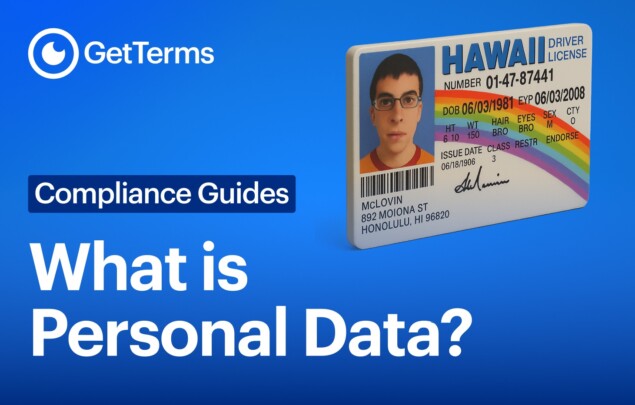
A concise guide to obtaining user consent correctly so you can use cookies on your website
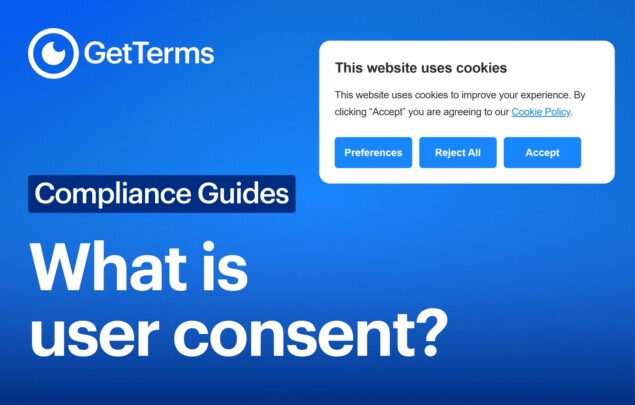
The GDPR impacts any business that engages with individuals or other businesses located within those boundaries.
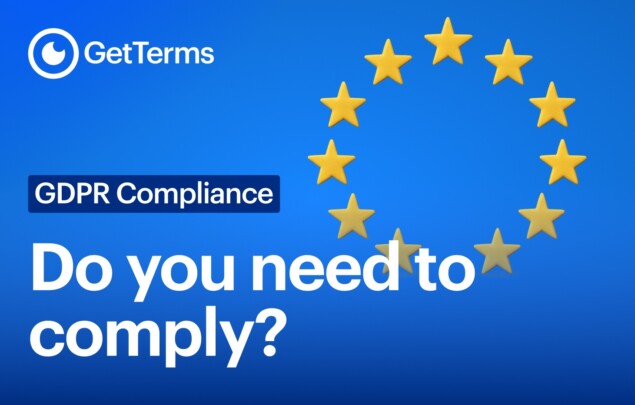
Learn how to add the cookie consent banner to your website
